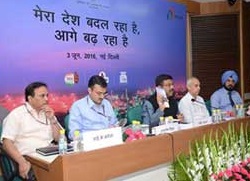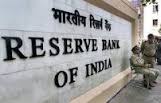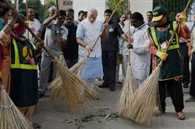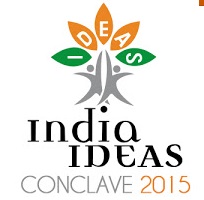1) World Bank appoints first adviser to tackle LGBTI discrimination
- Current Affairs The World Bank has appointed its first adviser tasked with promoting the lesbian, gay, bisexual, transgender and intersex (LGBTI) issues in its development work.
- The newly created senior position is part of the bank`s efforts to solidify its commitment to researching and curbing discrimination against LGBTI persons across the 136 countries where it has offices.
- The initiative by the poverty-fighting institution comes at a time when discrimination against LGBTI people is facing increased scrutiny globally.
- The bank, which makes loans in developing countries and conducts research, named Clifton Cortez to fill the position. With two decades of experience in development, Cortez most recently managed partnerships for the United Nations program on HIV/AIDS UNAIDS.
- In recent years, the bank`s research has increasingly turned to the economic impact of discrimination on LGBTI persons.
- In 2016, the Washington-D.C.-based organization has been collecting data on the socioeconomic status of LGBTI persons worldwide and launched several research projects on LGBTI discrimination.
- The World Bank`s announcement comes a day after the U.S. Agency for International Development (USAID) publicized a new rule barring its foreign aid contractors from discriminating against LGBTI persons in the services it funds.
- In September, 2016, the United Nations appointed its first independent investigator to help protect the community worldwide from violence and discrimination.
- A U.N. report in 2015 said hundreds of LGBTI people have been killed and thousands injured in recent years, in violence that included knife attacks, anal rape and genital mutilation.
2) AP, Telangana top Ease of Doing Business list

- Andhra Pradesh and Telangana have topped the list in the Ease of Doing Business rankings. Commerce and Industry Minister Nirmala Sitharaman on 31st October released the report on State-wise Ease of Doing Business rankings in New Delhi.
- The rankings are on the basis of 340-point business reform action plan and their implementation by the States. Andhra Pradesh and Telengana topped the all-India ranking with 98.78 per cent each, followed by Gujarat with 98.21 per cent, Chhattisgarh with 97.32 per cent and Madhya Pradesh with 97.01 per cent. Gujarat has slipped to third position from the first rank.
3) Maharashtra offers best environment for agri-business: NITI Aayog index

- Maharashtra tops in implementing agricultural reforms and offers the best environment for doing agri business, according to an assessment carried out by NITI Aayog. Maharashtra scored 81.7 on the index partly due to its decision to exclude fruits and vegetables from the APMC Act.
- Gujarat, Rajasthan and Madhya Pradesh are in the next three positions in the ‘Agricultural Marketing and Farm-Friendly Reforms Index’ launched by the Aayog on 31st October. The Centre is trying to encourage States to carry out reforms in the three broad areas of agricultural market, land lease and reforms related to forestry on private land-felling and transit of trees.
4) Criteria for ranking

- The index is based on implementation of seven provisions under the model Agriculture Produce Market Committee (APMC) Act, joining the online marketing platform eNAM, special treatment to fruits and vegetables for marketing and levels of taxes in mandis.
- NITI Aayog is in consultations with States that have not performed well to find out what are the constraints that they face and why are they reluctant in carrying out reforms.
- The index is aimed at helping the States identify and address problems in the farm sector, which suffer from low growth, low farm income and agrarian distress.
- These indicators reveal ease of doing agribusiness as well as opportunities for farmers to benefit from modern trade and commerce and have wider option for sale.
- NITI Aayog has asked States to bring about changes in its APMC Act based on a model legislation to make it more flexible and allow a national agriculture market to emerge that would give farmers the freedom to sell there produce wherever they want.
- While the Centre is talking about bringing in reforms in the APMC Act, there are some States that are yet to adopt the Act or have revoked it. These include Bihar, Kerala, Manipur, Daman and Diu, Dadra and Nagar Haveli, Andaman & Nicobar. They are not included in the ranking.
5) Centre notifies rules for Real Estate Act for five UTs

- The Centre has notified the rules for Real Estate Act that seeks to regulate the housing sector besides bringing transparency and ensuring timely completion of projects in five Union Territories.
- The rules notified by the Housing Ministry will be applicable to Andaman and Nicobar Islands, Chandigarh, Dadra and Nagar Haveli, Daman and Diu, and Lakshadweep.
- Ministry of Urban Development will come out with such rules for the National Capital Region of Delhi while the other States and UTs will come out with their own rules. The Act, which is touted as a major reform measure to regulate the vast real estate sector, requires registration of all projects with state-level Real Estate Regulatory Authorities to ensure protection of the interests of both buyers and builders.
###6) Govt marks Rs 10 lakh each for mandis for waste management

- Agriculture Ministry has prepared a Swachhta Action Plan under which Rs 10 lakh will be provided to each mandis for setting up waste management plants.
- The fund will be spent under e-National Agriculture Market, e-NAM scheme. According to the Agriculture Minister Radha Mohan Singh under Rashtriya Krishi Vikash Yojana, one percent funds will be spent on Solid and Waste Management.
- As part of Clean India Campaign, Swachhta Pakhwada was observed between 16th to 31st October in all department of the Ministry. It was also carried out in agriculture mandis, fish markets and villages near each Krishi Vigyan Kendras across the country.
- The Ministry held video conferencing with representatives of states to sensitize them and make adequate provisions in their existing schemes to prepare compost manure from farm waste.
7) Unimpressed by reforms, S&P retains India rating

- The government’s reform agenda failed to pass muster yet again as international ratings agency Standard and Poor’s (S&P) has retained India’s rating at ‘BBB-/A-3’ with a Stable outlook and ruled out a review even 2016.
- This is the lowest investment grade rating and the government has been pitching for an upgrade after reforms such as the Insolvency Code and Constitution Amendment Act for the Goods and Services Tax.
- According to the ratings agency statement the outlook indicates that do not expect to change rating on India in 2015 or next, based on our current set of forecasts. A rating upgrade may be possible if the government’s reforms improve the fiscal situation and the net general government debt falls below 60 per cent of the GDP, it added. At present, it is about 69 per cent of the GDP. In September, Moody’s Ratings had said a review of India’s ratings may be possible only after one to two years.
- S&P was more optimistic about the economy and pegged the GDP growth rate at 7.9 per cent in 2016 and an average of eight per cent over 2016-18.
- The ratings on India reflect the country’s sound external profile and improved monetary credibility
8) Four-tier GST rate structure finalised: Arun Jaitley

- Goods and Services Tax (GST) Council has finalised four-tier GST rate structure of 5, 12, 18 and 28 per cent. According to the Finance Minister Arun Jaitley:
- Five percent tax will be levied on mass consumption items used by common people.
- To safeguard the interest of poor and keeping inflation under check, half the items in Consumer Price Index basket like foodgrains, would not be taxed at all.
- Luxury items like high-end cars and demerit goods including tobacco and aerated drinks, will be taxed at the highest rate and would also attract a cess in a way that the total incidence of tax remains at almost the current level.
- The items which are taxed at present at the rate 30 to 31 percent will now be taxed at 28 per cent.
- Some of the luxurious items will be transferred to 18 per cent tax bracket.
- Fifty thousand crore rupees will be required to pay to states for loss of revenue in the first year of GST rollout.
- Compensation pool would be for five years. Surplus amount in the pool will be shared on the basis of formula determined by the GST Council.
9) Tatas slip to seventh spot in attractive brands list

- Once among the top five most attractive brands in India, the venerable house of Tatas has fallen off that perch 2016, according to a study of the country’s most attractive brands released on 3rd November.
- The annual study, which comes out every October-November, has ranked Tata at seventh position, a drop of three spots from 2015 when it was ranked fourth.
- The fieldwork for this study was done in August-September 2016, before the boardroom battle erupted between ousted Tata group chairman Cyrus Mistry and interim chairman Ratan Tata began.
- The Tata brand was among the top five in 2013 and 2015, the last two times released the (attractive brands) report. The drop now indicates that key influencers no longer consider the Tata brand to be aspirational. This has partly to do with the issues that the Tata group has been grappling with for a few years now, which is showing up in how key influencers perceive the brand.
- TRA assigns values to brands based on their attractiveness quotient. Tata’s attractiveness quotient has seen a 20 per cent drop in 2016 over 2015.
10) RBI allows banks to issue masala bonds

- The Reserve Bank of India (RBI) on 3rd November allowed banks to issue rupee-denominated bonds, or masala bonds, in the overseas market to shore up their capital base as well as for financing infrastructure and affordable housing.
- To strengthen their capital base, banks can raise perpetual debt instruments, which can be considered for calculating a bank’s additional tier-1 capital, or debt capital instrument that can go into calculating a bank’s tier-2 capital.
- These bonds will be issued according to the Basel-III norms and therefore, will have loss absorption clause. Under this clause, a bank can choose not to honour the coupon payment in case of financial stress. For financing infrastructure and affordable housing, the banks can issue long-term bonds, which doesn’t have the loss absorption clause.
- The central bank had first announced its intention for letting banks tap the overseas market with rupee bonds on August 25 when the RBI announced a slew of measures to develop the bond and currencies market. Companies were already allowed to raise money through masala bonds and a few issuances totaling Rs 7,472 crore have been done.
- The rupee bond route will open an additional avenue to raise funds for banks and will help develop the market of rupee-denominated bonds abroad, the RBI said.
- The borrowing by the banks would still has to be within the overall limit of foreign investment in corporate bonds, which is pegged at Rs 2,44,323 crore at present. Of this, foreign investors have exhausted Rs 1,66,120 crore so far.
###11) GST Council meeting remains inconclusive on dual control issue

- The government says Goods and Service Tax Council meeting remained inconclusive on cross empowerment or dual control issue.
- According to Finance Minister Arun Jaitley:
- State Finance Ministers will meet on 20th of November to sort out pending issues. GST council completed a substantial part of discussion.
- Tax exemption limit under the GST will be 20 lakh rupees and further four drafts will be prepared for discussion in this connection.
- All the taxation officers have to administer one tax which is the GST and therefore there has to be clearly defined guidelines.
- There cannot be two competing assessing authorities for the same assessee. Five suggestions were made on how to divide the assessee base.
12) NITI Aayog pitches for easing single-brand retail sourcing norms

- NITI Aayog Chief Executive Officer Amitabh Kant has proposed to Prime Minister Narendra Modi that the mandatory domestic sourcing norms for single-brand retail entities with foreign direct investment (FDI) beyond 51 per cent be eased.
- The proposal, which favours lowering the threshold of domestic sourcing from 30 per cent of purchase value of products sold for five years to 15 per cent, could, if implemented, make it more attractive for companies such as Apple and Ikea to do business in India.
- Kant has also proposed that domestic sourcing for global operations by foreign investors be allowed to be set off against domestic sourcing requirements.
- Under the existing policy, for the first five years of their operation, the entities do not have to meet their 30 per cent domestic sourcing obligations annually, but as an average of five years.
- To attract big foreign companies such as Apple, the government had done away with domestic sourcing norms for those producing “cutting-edge products”, but in June 2016, the exemption period was restricted to three years.
13) Govt to launch clean consumer fora, clean market schemes

- Consumer Affairs Department on 4th November decided to launch clean consumer fora and clean market schemes under Swachh Bharat Mission for the next two years.
- The scheme Clean Consumer Fora financial assistance will be provided to Consumer Fora for sanitation facility at district Consumer Forum.
- Under the Clean Market scheme financial assistance will be provided to the voluntary consumer organisations, VCOs. They will be asked to adopt a market place to carry out awareness activities on cleanliness in association with the market association and local authorities.
- 100 rain water harvesting systems have been planned for construction by Central Warehousing Corporation in the next two years. The Corporation has also planned to construct toilet blocks in ten schools. Rs 1.78 crore have been provisioned for Swachh Bharat Kosh during the current fiscal.
- The Swachhta Pakhwada was observed by the Ministry of Consumer Affairs, Food and Public Distribution from 16th to 31st of October, 2016.
-
- The Minister of Consumer Affairs inaugurated a Consumer Mela on 20th during the Pakhwada at Central Park, Connaught Place with the main objective of bringing the consumers and the companies face to face so as to resolve the grievances and also to make the consumers aware of their responsibility towards cleanliness.
14) Govt imposes anti-dumping duty on certain Chinese steel products

- Centre has imposed anti-dumping duty on imports of steel wire rods from China to protect domestic manufacturers from cheap in-bound shipments. The Department of Revenue in a notification said the duty is being imposed for six months.
- The measure follows recommendation by the Directorate General of Anti-Dumping and Allied Duties that steel wire rods was being exported by China below the normal value and the domestic industry has suffered material injury because of such imports.
- Wire rod of alloy or non-alloy steel finds applications in many sectors such as automotive components, welding electrodes, fasteners, binding wires for construction industry and armoured cables.
- India has already slapped anti-dumping duty on certain cold-rolled flat steel products from four nations, including China and South Korea.
15) India Ideas Conclave 2016 begins in Goa

- The 3rd India Ideas Conclave is taking place between November 4 and 6 in Goa. The central theme of the Conclave is India at 70 - Democracy, Development and Dissent.
- The three days Idea exchange program will have Defence Minister Manohar Parrikar, Rail Minister Suresh Prabhu, BJP president Amit Shah and leaders from all walks of life exchange ideas.
- With an aim to discuss and debate central theme of India at 70: Democracy, development & Dissent, the 3rd India Idea Conclave kicked off in style in Goa.
- The three day event, to be held from November 4 to 6th, will see participation of over 350 intellectuals including government leaders, corporate leaders, scholars, journalists, politicians and social activists.
- Developments in defence, railways, aviation, governance, education, foreign policy are likely to be discussed at length in the Conclave. The inaugural session saw interventions by Union Railway Minister Suresh Prabhu and BJP president Amit Shah.
- Chairman Prasar Bharati, Dr A Suryaprakash along with eminent journalist turned MP Swapan Das Gupta, Tavleen Singh, Madhu Kishwar, Arnab Goswami, Film maker Vivek Agnihotri and other dignitaries will share their ideas on road ahead for media.
- The first two editions of the conclave saw the participation of scholars from over 25 countries including several Heads of State.
16) NCAER pegs GDP growth for FY16 at 7.6%

- National Council of Applied Economic Research has forecast 7.6 percent GDP growth rate in financial year 2016-17. The think tank in it`s mid-year review said, the anticipated improvement in the agricultural sector and the associated increase in rural demand will give an upward push to country`s economic growth.
- The think tank also said, food inflation is also showing signs of dampening in the latter part of the second quarter and fuel inflation may revive. It said, urban demand is predicted to remain strong and external demand continues to be volatile.
- The report said, unlike past two years, 2016 witnessed a normal rainfall. With that, the area under Kharif sowing is about 3.5 per cent more than 2015, with the sowing of pulses being about 29.1 per cent more than 2015.
- It said, 10 to 11 per cent increase is expected in the output of Kharif foodgrains over 2015 output of 124 million tonnes.
- It said, the manufacturing sector is also giving positive signals with the `Purchasers` Managers Index` and `Index of Industrial Production` for core sectors and auto sales are going up. NCAER said, domestic aviation sector growth continues to be robust. However, it said, other service index indicators continue to be muted.